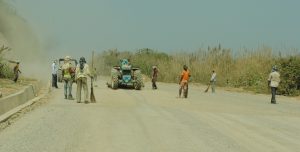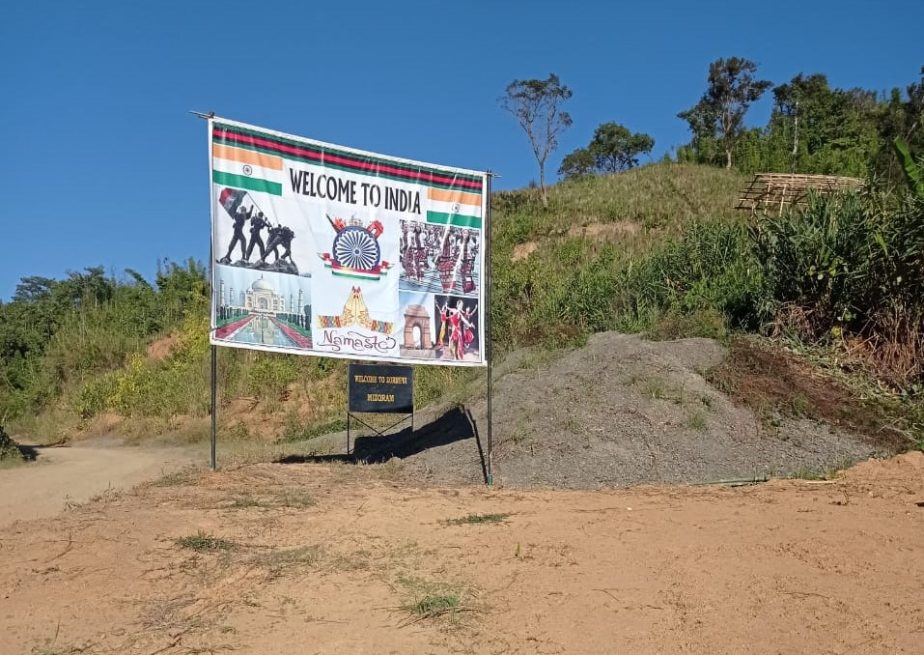Rajeev Bhattacharyya

Developments in Myanmar since the military coup three years ago seem to have convinced a section of high-ranking Indian government officials that the flagship Kaladan project has hit a dead-end. They believe that the chances of work on the incomplete stretch of the ambitious initiative being resumed are bleak.
Early this month, the Indian government issued a travel advisory asking all Indian nationals to refrain from visiting Myanmar’s Rakhine State where a fierce war is on between the Myanmar junta and the Arakan Army. A vast swathe of territory in Rakhine State and the adjoining territory in southern Chin State have already been taken over by the Arakan Army compelling a section of the regime forces to flee to the Indian border state of Mizoram and Bangladesh for safety from where they were air-lifted to Myanmar.
The Kaladan Multi-Modal Transit Transport project is a key component of India’s Act East Policy. It aims at providing an alternate outlet to the country’s landlocked northeast. Since the project commenced 13 years ago, it has missed many deadlines.
The Kaladan project has two components — road and inland waterway — to link Mizoram in India’s northeast to Sittwe port in Rakhine State. Zorinpui on the border between the twin countries will be connected to Paletwa in Myanmar with an approximately 68-mile-long road and 98 miles of inland waterway through the Kaladan river from Paletwa to Sittwe port.
The 68-mile stretch of highway from Paletwa to Zorinpui at the India-Myanmar border is yet to be constructed. The highway has two parts — 42 miles from Paletwa to Kaletwa and 26 miles from Kaletwa to Zorinpui. This highway passes through a zone that is among the worst-affected regions in the ongoing fighting between the military and resistance forces in Myanmar.
The other segments of the project — construction of the Sittwe Port at the mouth of the Kaladan River in Rakhine State and a river terminal at Paletwa as well as dredging of the Kaladan River – have been completed in Myanmar.
Early in 2022, the Indian government terminated a joint venture contract with two companies, Engineers Projects India Limited (EPIL) and C & C Construction Co. Ltd for constructing the highway. Sources claimed that the two firms were facing problems in deploying their employees in Myanmar following an incident in 2019 when 10 people, including four Indian nationals and two employees of EPIL were abducted between Paletwa and Kyauktaw by the Arakan Army. They were released but not before one Indian national died due to a heart attack while being in the custody of the rebel outfit.
Subsequently, in 2022, the Indian government inked a new contract with IRCON International Limited as the project implementing agency (IRCON) is a public sector undertaking under the Indian Ministry of Railways. According to the agreement, the incomplete highway would be constructed by local sub-contractors to be decided by IRCON and completed within 40 months. Another clause says that the contractor can extend the deadline for reasons such as “war, riots, civil disorder, earthquake, fire, explosion, storm, flood, pandemic or other adverse weather conditions, strikes, lockouts or other industrial action…”
When the new contract was firmed up with IRCON, a section of Indian government officials was of the view that the Kaladan project would never be completed without the engagement of local sub-contractors and the assistance of the Arakan Army. An official told The Diplomat that IRCON had successfully concluded separate agreements last year with two Myanmar-based companies – Myanmar New Power Construction Limited and Su Htoo Sen – to complete the project in different segments of the incomplete highway.
The Arakan Army and Myanmar military had agreed on an informal ceasefire from 24 November 2022, raising hopes that the Kaladan project could be completed in a short period following IRCON’s contracts with the Myanmar-based firms.
However, the situation turned for the worse after Operation 1027 in northern Shan State when the Three Brotherhood Alliance routed the Myanmar military across a vast swathe of the region bordering China.
The Arakan Army is part of the Three Brotherhood Alliance. The ceasefire between the Arakan Army and Myanmar military was broken in November last year after fresh clashes erupted resulting in the displacement of thousands of civilians. Similar to the situation in many parts of the country, the Myanmar military is on the back foot in Chin and Rakhine State and unable to recover the territories that it had lost to the resistance groups.

The incomplete stretch of the India-Myanmar Kaladan Multi Modal Transit Transport Project along the India-Myanmar border.
While Indian government officials are not optimistic about the future of the Kaladan project, the Arakan Army is of the view that construction can begin on the incomplete stretch of the highway. “We have been providing security for the project along the Kaladan since 2021. There is no security threat for the project,” Khaing Thu Kha, spokesperson of the Arakan Army, told The Diplomat. He alleged that the project was being delayed by the contractors.
However, it remains to be seen if the contractors would be willing to deploy their workforce in the conflict zone. Given the recent retaliatory attacks by the military against resistance strongholds, the possibility of air strikes in Rakhine State cannot be ruled out.
Rakhine State is among the most strategic regions in Myanmar and is rich in natural resources. The coastal state has immense strategic value for both China and India.
China has begun developing Kyaukphyu as a deep-water port not very far from the Kaladan port at Sittwe. Last December, China and signed a supplementary agreement for developing the deep-water port, where China’s state-owned Citic Group will have a 70 percent stake in the project. The port will allow China to bypass the South China Sea for oil imports, and gain access to the Indian Ocean. It is the gateway of the 1,700-km China-Myanmar Economic Corridor.
Indian government officials feel that China has already gained an upper hand in Rakhine State and could also use its influence to stall the Kaladan project.
No comments:
Post a Comment